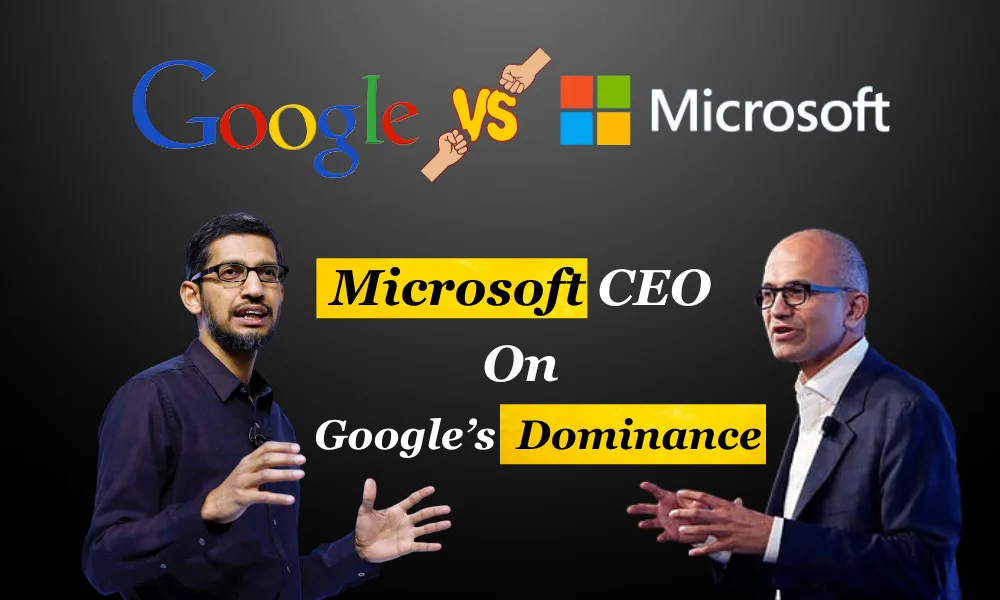Last updated on June 7th, 2024 at 11:04 am
In the fast-paced world of the digital realm, the battle for supremacy in the search engine landscape is heating up like never before. Microsoft’s top honcho, Satya Nadella, has thrown some intriguing ideas into the mix lately.
He’s been talking about Google’s dominance, its seemingly unshakable grip on the industry, and how artificial intelligence (AI) is set to reshape the game.
Despite Microsoft’s whopping $100 billion investment in Bing, Nadella isn’t holding back in his belief that Google still holds all the cards. So, in this deep dive, we’re going to dissect Nadella’s take, dive headfirst into the ongoing U.S. vs.
Google antitrust showdown, and explore what the future holds for search engines, all in the age of AI. Get ready for an exciting journey ahead!
Google’s Dominance and the Antitrust Trial
Satya Nadella dismisses Google’s claim that there is genuine competition in the search engine market as “bogus.” He firmly believes that artificial intelligence holds little promise for new entrants, labeling web search as the “biggest no-fly zone.” Nadella’s remarks are particularly pertinent in the context of the ongoing U.S. vs. Google antitrust trial.
This legal battle has unearthed troubling behavior by Google, including allegations of raising ad prices to meet revenue targets. The outcome of this trial could potentially reshape the entire search engine landscape and impact users, competitors, and advertisers alike.
Exclusive Rights and Google’s Dominance in AI
In their quest to maintain ‘Google’s dominance’ in AI-powered search, Google has been striking deals with publishers to get exclusive content rights. Satya Nadella emphasizes how significant these deals are.
He says that if Google becomes the exclusive gatekeeper to this valuable data, it could make other search engines less important. This has got publishers worried about fairness and accessibility, and it’s making them wonder how content will be shared on the internet in the future.
Search Engines: The Internet’s Organizing Backbone
Nadella emphasizes the vital role of search engines as the “organizing layer of the internet.” This perspective sheds light on the significance of search engines in shaping our online experiences and accessing information efficiently.
However, publishers are now grappling with concerns related to the rise of large language models (LLMs), exemplified by Google’s GPTBot. Many websites have taken measures to block these LLMs, fearing the use of their content and data for training and profit without adequate compensation.
Google’s Search Ads 360 Dispute
A pivotal issue in this ongoing rivalry is the Google Search Ads 360 platform. Microsoft aimed to simplify the process for advertisers to transfer ad campaigns from Google to Microsoft, but Nadella’s comments suggest that Google has not been receptive to accommodating the desired features.
This dispute underscores the challenges advertisers face in managing their campaigns effectively, especially when dealing with dominant players in the market.
The Vicious Cycle of Google’s Dominance
With a staggering 90% market share, Google continues to strengthen its search results and bottom line, according to Nadella. However, this dominance, he argues, is not solely based on product quality. Instead, it’s driven by the distribution advantage Google holds.
Nadella expresses concern that this advantage could become even more entrenched, reinforcing the status quo, despite the potential for AI to introduce new dynamics.
The Ambitious Launch of Bing and Bing Chat
Despite the odds, Microsoft launched the new Bing and Bing Chat, powered by OpenAI’s technology that also fuels ChatGPT. Nadella’s enthusiasm for this launch was palpable, although he admitted that Microsoft Bing’s market share remains modest at around 3%. Nadella acknowledges the challenge of competing with Google but remains committed to Microsoft’s vision.
No Breaking the Google Habit
Nadella underscores how default search agreements, like the one between Google and Apple, play a pivotal role in solidifying “Google’s dominance.” Users tend to stick with Google out of sheer habit, and altering these default settings is the key to changing user behavior.
Nadella sees a potential game-changer in making Bing the default search engine on platforms like Safari. However, he openly acknowledges that even on Microsoft’s operating systems, Bing’s market share lingers below 20%, highlighting the tenacity of user habits.
Microsoft’s $100 Billion Investment in Bing
Nadella’s mention of Microsoft’s whopping $100 billion investment in Bing shows how committed the company is to the search engine world. Even though Microsoft isn’t the biggest player in the field, they see internet search as a huge software category where they can make a significant impact.
Closing Thoughts: The Quest to Challenge Google’s Dominance
Satya Nadella’s candid words paint a clear picture of Microsoft’s uphill battle in the search engine arena against Google’s formidable dominance. He doesn’t claim Microsoft Bing Search is superior to Google Search, but he’s acutely aware of the daunting challenge posed by Google’s monopoly.
Nadella’s perspective suggests that the ongoing antitrust trial represents a last-ditch effort to rein in Google’s dominance. He envisions far-reaching consequences for consumers, competitors, and the entire digital ecosystem if Google isn’t compelled to adjust its practices. The question at the heart of this high-stakes showdown, with a potential value of $244 billion, is whether Google will be pushed to reshape the future of online search.
In summary, the battle between Microsoft and Google transcends a mere struggle for market share—it’s a contest for the very essence of the internet. As this gripping narrative unfolds, it underscores our ongoing pursuit of fairness, competition, and innovation in the digital age. The outcome will shape the experiences of billions of internet users worldwide and redefine the role of search engines in our lives.




